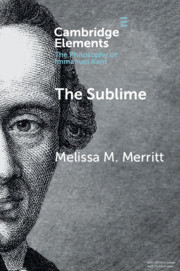
-
Select format
-
- Publisher:
- Cambridge University Press
- Publication date:
- 11 July 2018
- 05 July 2018
- ISBN:
- 9781108529709
- 9781108438704
- Dimensions:
- Weight & Pages:
- Dimensions:
- (229 x 152 mm)
- Weight & Pages:
- 0.15kg, 88 Pages
- Series:
- Elements in the Philosophy of Immanuel Kant
You may already have access via personal or institutional login- Series:
- Elements in the Philosophy of Immanuel Kant
Book description
This Element considers Kant's account of the sublime in the context of his predecessors both in the Anglophone and German rationalist traditions. Since Kant says with evident endorsement that 'we call sublime that which is absolutely great' (Critique of the Power of Judgment, 5:248) and nothing in nature can in fact be absolutely great (it can only figure as such, in certain presentations), Kant concludes that strictly speaking what is sublime can only be the human calling (Bestimmung) to perfect our rational capacity according to the standard of virtue that is thought through the moral law. The Element takes account of the difference between respect and admiration as the two main varieties of sublime feeling, and concludes by considering the role of Stoicism in Kant's account of the sublime, particularly through the channel of Seneca.
References
1 Primary Sources
Kant
References to the works of Kant, with the exception of the Critique of Pure Reason, follow volume and page of the German Academy edition: Kants Gesammelte Schriften, edited by the Königlich Preußischen Akademie der Wissenschaften, later the Deutschen Akademie der Wissenschaften zu Berlin (Walter de Gruyter [and predecessors], 1902–). Quotations are drawn, with occasional modifications, from the translations in the following volumes of the Cambridge Edition of the Works of Immanuel Kant:
(1992) Lectures on Logic. Ed. J. Michael Young.
(1996) Practical Philosophy. Ed. Mary J. Gregor.
(1996) Religion and Rational Theology. Ed. Allen W. Wood and George di Giovanni.
(2002) Critique of the Power of Judgment. Ed. Paul Guyer.
(2005) Notes and Fragments. Ed. Paul Guyer.
(2007) Anthropology, History, and Education. Ed. Günter Zöller and Robert B. Louden.
I have consulted the following translations as well:
(1987) Critique of Judgment. Trans. Werner S. Pluhar. Indianapolis: Hackett.
(2003 [1929]) Critique of Pure Reason. Trans. Norman Kemp Smith. Basingstoke, Hampshire: Palgrave Macmillan.
I use the following abbreviations for Kant’s works:
- Anth
Anthropology from a Pragmatic Point of View
- CJ
Critique of the Power of Judgment
- CPR
Critique of Pure Reason
- CPrR
Critique of Practical Reason
- FI
First Introduction to the Critique of the Power of Judgment
- JL
Jäsche Logic
- MFNS
Metaphysical Foundations of Natural Science
- MM
Metaphysics of Morals
- MM-DV
Metaphysics of Morals, Doctrine of Virtue
- Refl
Reflexionen (Academy volumes 14–17)
- Rel
Religion within the Boundaries of Reason Alone
- WIE
‘What is Enlightenment’
Others
2 Secondary sources
Metrics
Full text views
Full text views help Loading metrics...
Loading metrics...
* Views captured on Cambridge Core between #date#. This data will be updated every 24 hours.
Usage data cannot currently be displayed.
Accessibility standard: Unknown
Why this information is here
This section outlines the accessibility features of this content - including support for screen readers, full keyboard navigation and high-contrast display options. This may not be relevant for you.
Accessibility Information
Accessibility compliance for the PDF of this book is currently unknown and may be updated in the future.


